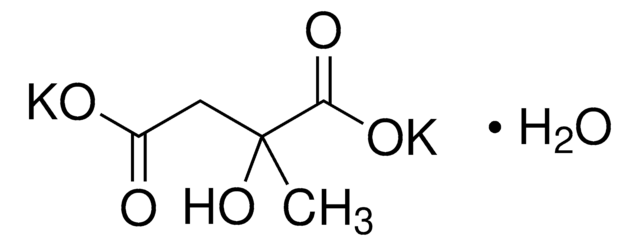34863
2-Propanol
99.9%, suitable for HPLC
Synonym(s):
isopropanol, sec-Propyl alcohol, IPA, Isopropanol, Isopropyl alcohol
About This Item
Recommended Products
product name
2-Propanol, suitable for HPLC, 99.9%
vapor density
2.1 (vs air)
Quality Level
vapor pressure
33 mmHg ( 20 °C)
44 mmHg ( 25 °C)
Assay
99.9%
form
liquid
autoignition temp.
750 °F
expl. lim.
2.0-12.7 %, 93 °C
technique(s)
HPLC: suitable
impurities
≤0.0005% non-volatile matter
≤0.001% free acid (as C2H5COOH)
≤0.05% water (Karl Fischer)
color
APHA: ≤10
transmittance
210 nm, ≥20%
220 nm, ≥50%
230 nm, ≥75%
260 nm, ≥98%
refractive index
n20/D 1.377 (lit.)
pH
7.0 (20 °C)
bp
82 °C (lit.)
mp
−89.5 °C (lit.)
density
0.785 g/mL at 25 °C (lit.)
UV absorption
λ: 205 nm Amax: ≤1.0
λ: 210 nm Amax: ≤0.70
λ: 220 nm Amax: ≤0.20
λ: 230 nm Amax: ≤0.10
λ: 260 nm Amax: ≤0.01
λ: 400 nm Amax: ≤0.01
application(s)
food and beverages
SMILES string
CC(C)O
InChI
1S/C3H8O/c1-3(2)4/h3-4H,1-2H3
InChI key
KFZMGEQAYNKOFK-UHFFFAOYSA-N
Looking for similar products? Visit Product Comparison Guide
Related Categories
General description
Application
Packaging
Other Notes
2-Propanol Miscibility/Immiscibility Table
- The article number 34863-4X2.5L will be discontinued. Please order the single bottle 34863-2.5L which is physically identical with the same exact specifications.
- The article number 34863-6X1L will be discontinued. Please order the single bottle 34863-1L which is physically identical with the same exact specifications.
Signal Word
Danger
Hazard Statements
Precautionary Statements
Hazard Classifications
Eye Irrit. 2 - Flam. Liq. 2 - STOT SE 3
Target Organs
Central nervous system
Storage Class Code
3 - Flammable liquids
WGK
WGK 1
Flash Point(F)
53.6 °F - closed cup
Flash Point(C)
12.0 °C - closed cup
Certificates of Analysis (COA)
Search for Certificates of Analysis (COA) by entering the products Lot/Batch Number. Lot and Batch Numbers can be found on a product’s label following the words ‘Lot’ or ‘Batch’.
Already Own This Product?
Find documentation for the products that you have recently purchased in the Document Library.
Customers Also Viewed
Our team of scientists has experience in all areas of research including Life Science, Material Science, Chemical Synthesis, Chromatography, Analytical and many others.
Contact Technical Service





